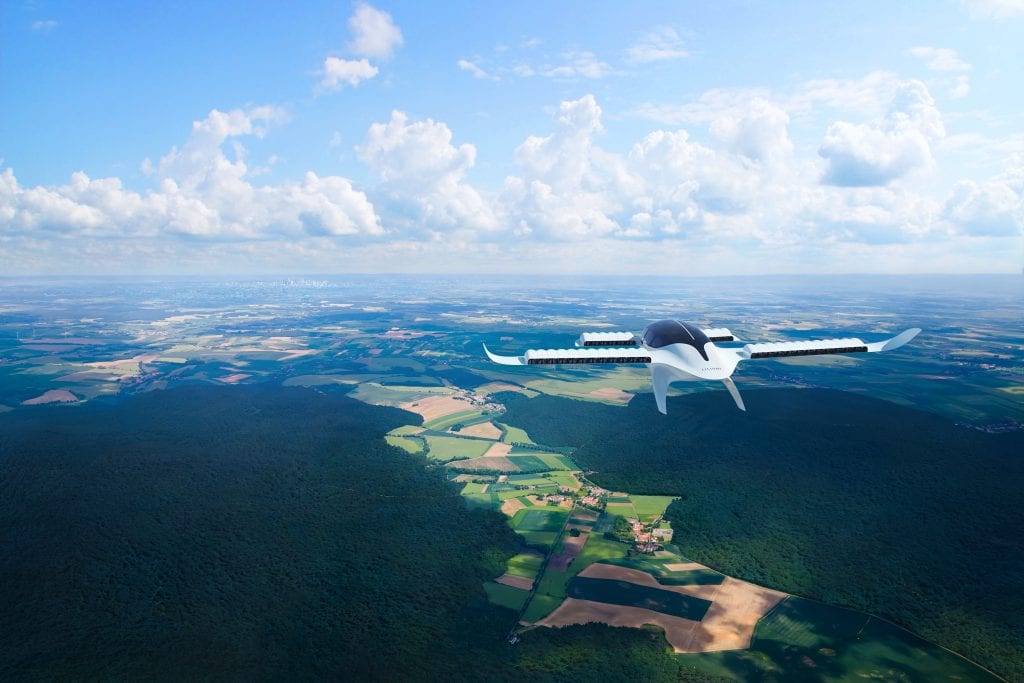
The 7-Seater Jet is an updated version of Lilium’s 5-Seater aircraft and carries six passengers and one pilot. (Lilium)
Lilium revealed its latest electric vertical take-off and landing (eVTOL) aircraft, the 7-Seater Lilium Jet, as a culmination of four generations of technology demonstrators, according to a March 30 press release published by the Munich, Germany-based company. Lilium will also merge with Qell Acquisition Corp. making the eVTOL maker a publicly listed company.
“We’re incredibly excited to reveal the development of our 7-Seater Lilium Jet and announce the next stage of our growth,” Daniel Wiegand, Co-Founder and CEO of Lilium, said in a statement. “This is a validation of all the hard work over the last five years from our talented team and our world-class partners and investors.”
The 7-Seater is an updated version of Lilium’s 5-Seater aircraft and carries six passengers and one pilot. It has received CRI-A01 certification from EASA and concurrent type certification with EASA and the FAA, according to the release. It has a cruise speed of 175 mph and flies at 10,000 feet with a range of 155 miles.

The aircraft uses Lilium’s proprietary Ducted Electric Vectored Thrust (DEVT) technology which is made up of 36 electric ducted turbo fan engines integrated into the wing flaps and allows Lilium to lower noise emissions and its ground footprint. (Lilium)
The aircraft uses Lilium’s proprietary Ducted Electric Vectored Thrust (DEVT) technology which is made up of 36 electric ducted turbofan engines integrated into the wing flaps and allows Lilium to lower noise emissions and its ground footprint.
Lilium is partnering with multiple suppliers for the 7-Seater Jet including Aciturri who is manufacturing the fuselage and wing systems, Toray Industries who are supplying high-performance carbon fiber composite, and Lufthansa Aviation Training which is sourcing pilots and delivering a training program.
“Our vision is to create a sustainable and accessible mode of high-speed travel and bring this to every community,” Wiegand said. “Transport infrastructure is broken. It is costly in personal time, space consumption and carbon emissions. We are pursuing our unique electric jet technology because it is the key to higher-capacity aircraft, with lower cost per seat mile while delivering low noise and low emissions.”

The aircraft has received CRI-A01 certification from EASA and concurrent type certification with EASA and the FAA, according to the release. It has a cruise speed of 175 mph and flies at 10,000 feet with a range of 155 miles. (Lilium)
Lilium is planning to use the 7-Seater in commercial operations starting in 2024, according to the release. To meet this goal they will need to finalize serial production facilities in Germany, launch the serial production aircraft and complete the type certification with appropriate authorities. This will all be done with the funds provided in the business combination agreement with Qell.
“We are thrilled to be partnering with Lilium to together build the leader in regional electric air mobility,” Barry Engle, Founder and CEO of Qell, said in a statement. “Qell set out to find an exceptional and ambitious technology company, with significant growth potential — and in Lilium we have found that. Lilium has unique technology and one of the most accomplished engineering and commercial teams in electric aviation. The 7-Seater Lilium Jet is a game-changer for transportation.”
The company is estimated to receive $830 million of gross proceeds from a fully committed common stock PIPE offering of $450 million and $380 million cash held in trust, according to the release. The merger is expected to be completed in the second quarter of 2021.
In November 2020, Lilium announced a partnership with Tavistock Development Company and the City of Orlando to launch an electric air mobility network in 2025. They are planning to have a network of up to 14 sites with about 125 jets.
Lilium will also operate in Germany through agreements with Köln Bonn Airport and Düsseldorf Airport using approximately 190 jets.